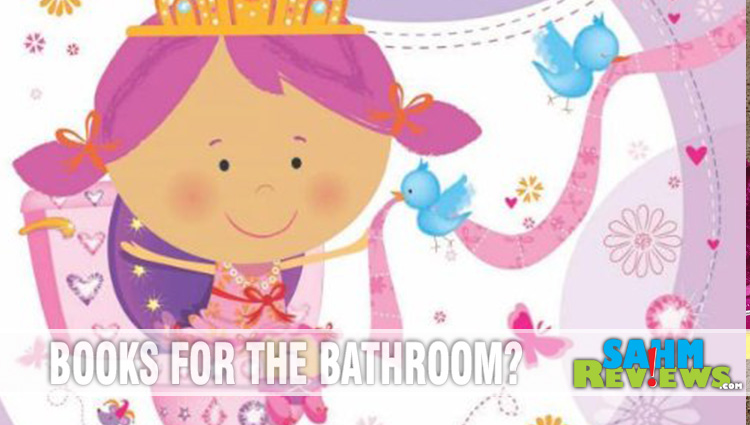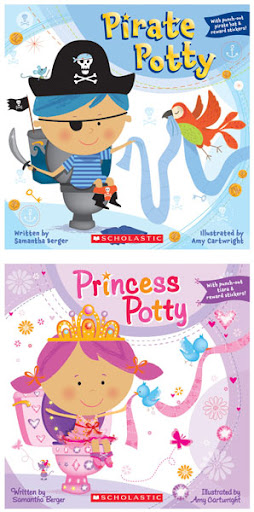Stickers are Good…

I became a mother of four overnight, via the foster care system. So my acquisition of Mom skills and techniques was a madly fast combination of trial-error, parent-modeling of my 26-year-old nanny, and dashing off desperate questions to friends via Facebook.
Occasionally I question my qualifications as a “real” mother, but then I look around and notice my kids are happy, well-behaved, fed, and clean, so I must not be doing too badly.
From that perspective I offer the following five-word review of the sticker-based, potty training stories, “Princess Potty” and “Pirate Potty.”
Stickers good. Gender stereotyping bad.
Explanation 1: Instant reward gets the best result. The instant gratification of a sticker reward has worked wonders in the bathroom with my 22-month old. (Note: She asked to start going potty because of watching her older siblings. She wants to do everything they do.) My daughter has understood completely that if something comes out in the toilet, she gets a sticker! When she gets 10 stickers, she got a piece of candy! She loves the feeling of pride and all the praise! And she LOVES pulling up her own underwear, flushing the toilet herself, washing her hands. Simple, straightforward, and cheap. Meanwhile, I am still trying to figure out how to put together the punch-out tiara for her to wear. Oh bother… here. Just play with this block!
Explanation 2: Being a princess, in real life, isn’t that great. And neither is being a pirate. These two books are sweet stories of a little girl princess and a little boy pirate learning how to potty. OK, call me a humbug of the imagination, but I know that the ideas we teach our little ones from early on give them a sense of what they are capable of. The princess concept of fairy tales is false, and pirates are rogues.
What does a movie princess do for a living? Oh, yes, that’s right. She lays around in a slumber (or waits around) for a prince to come and make everything happily every after. Gag me with a spoon. Oh, yes, and pirates are people who steal things, often violently.
Come on, Moms… do you really want to promote that kind of identification with your kids?
Explanation 3: Boys are pirates, and girls are princesses? Barf. My 4-year-old twins are obsessed with princesses. Why? Because in their previous homelife, their other Mom bought them every Disney fairy-princess themed item ever built. And my 5-year-old son was mainlined into the Lightening McQueen/Spiderman items.
Gender stereotyping can and will limit the way your children think about themselves. We want to give our kids boundaries, but do we want to tell our daughters that the stereotypical view of a “passive” female is the role model of choice? Do we want to instill in our sons that they are expected to be aggressive and violent?
According to Angela Gooden, who has study in the impact of gender stereotyping in children’s books: “As they develop, children look for structure in their lives and are driven by an internal need to fit into this structure.” When kids are repeatedly given stereotypical messages, their choices of what they want to become or accomplish is limited by these gender stereotypes.
The mere fact that these potty training authors felt they needed to write two different books — one pirate, one princess — indicates their willingness to give in to the cultural drive that put limits on who our children believe they can be, and what they can achieve.
I expect that my daughters would have liked dolls anyway — they are naturally nurturing — but so is my wildly active son, who loves to play with his sisters’ dollhouse and with the dress up clothes that Granny gave them. The girls chase around the backyard with their own makeshift guns, shouting “bang bang bang!” and they want to climb every tree my son does. They all love Astroboy, and see themselves as him. At this age, they are absorbing all the possibilities of life: why limit them to only the “femaley” ones? Or to what boys “should” be?
The princess label isn’t big enough for for my daughters, and my sweet, wildly sensitive son would never make a good pirate, despite his desire to swing from ropes.
Conclusion: In terms of potty training, less is more. These books, though pretty and offering lots of distractions, aren’t necessary. And when paired with the one-dimensional images of girls and boys in the media, could actually harm your child on a deeper, more meaningful level.
Stickers, however, are good.



Amen on the gender stereotyping. Anything that opens a child's eimagination to new and exciting possibilities should be encouraged. When a child says "I want to be a _____ ." we should help them figure how to make that possible, not slam a door on the idea because of their gender.
Yep, definitely on the gender stereotyping. I don't know that my 2-year-old nephew would want to be a pirate. My older niece and nephew are really into that, though, unfortunately…just last week we were at McDonalds, and my 9-year-old niece was sad because she'd gotten a crown toy in her happy meal that she already had. And her grandma said "why don't you get the boy toy?&